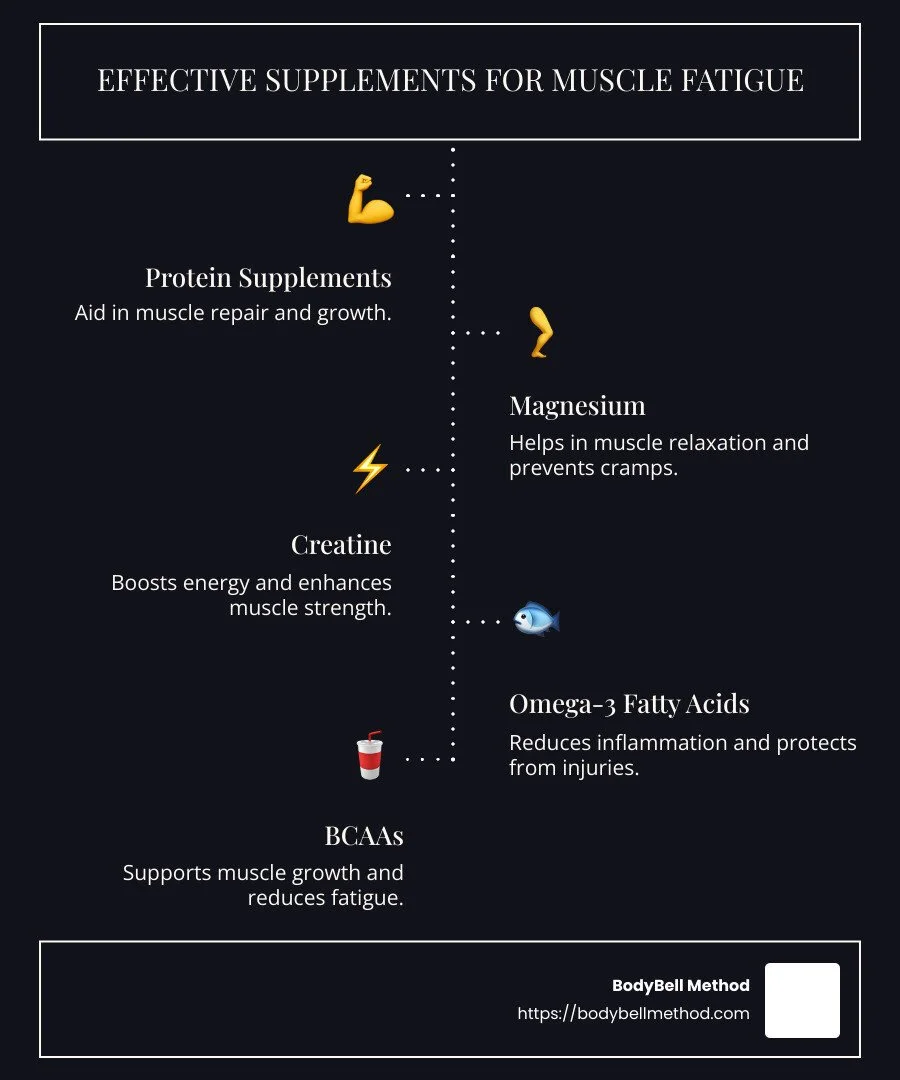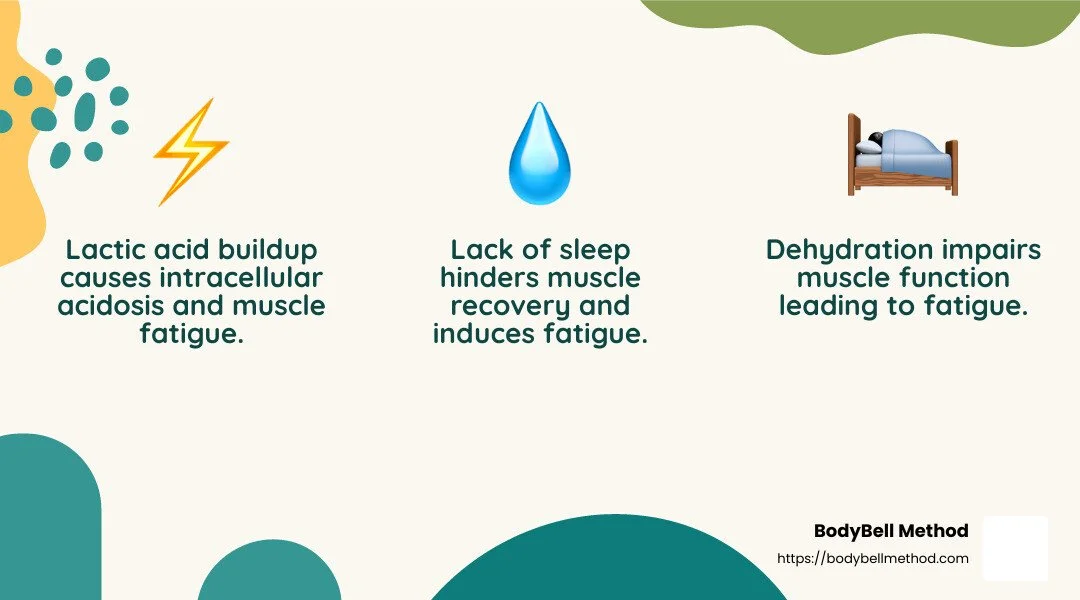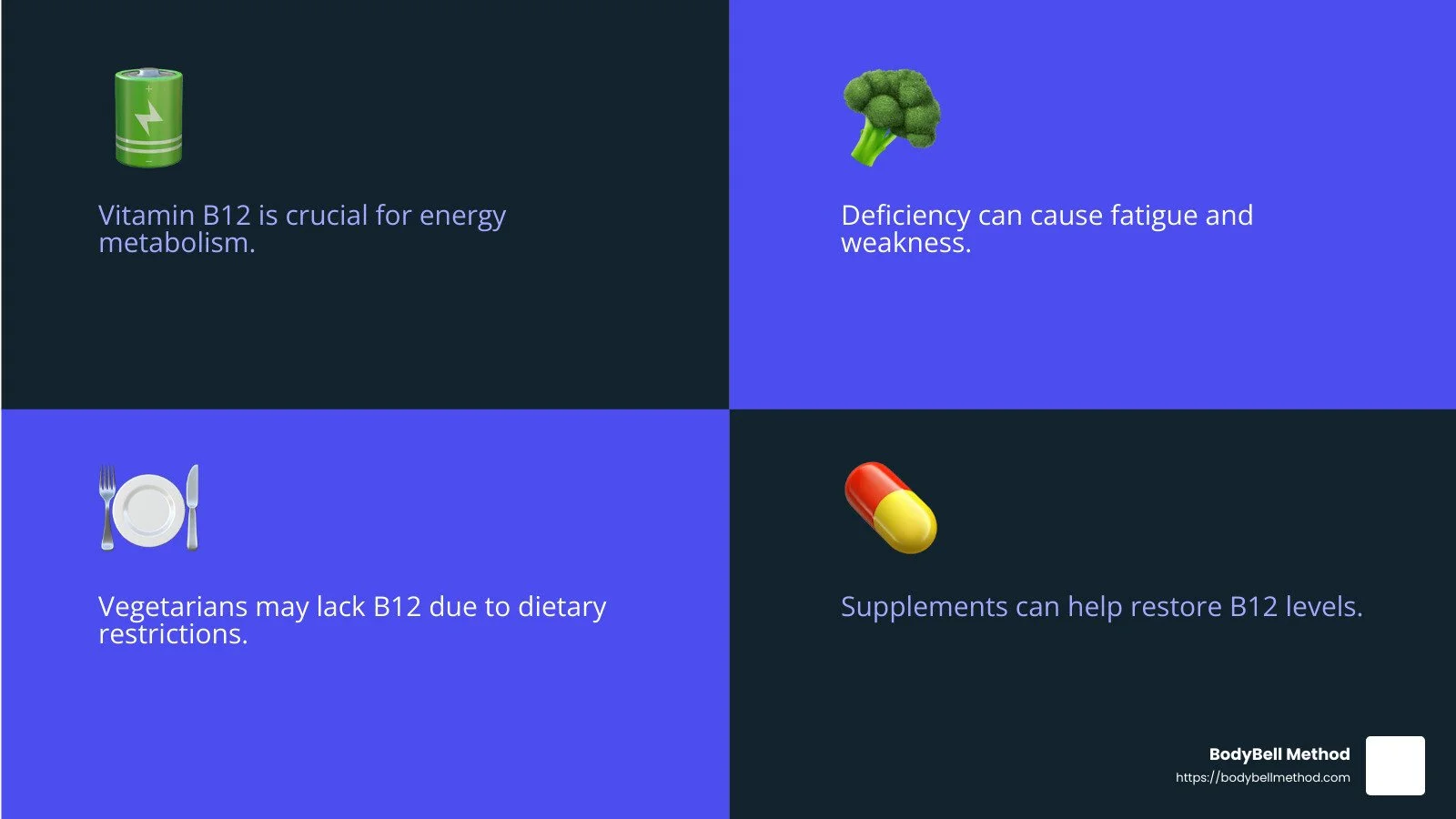Stay Strong: Best Supplements to Combat Muscle Fatigue
When it comes to supplements for muscle fatigue, getting the right nutrients can make a big difference in feeling strong and energetic. Many people experience muscle fatigue, especially after intense workouts or when starting a new fitness routine. To combat this, some seek supplements to speed up recovery and refresh muscle strength.
Here are some effective supplements for muscle fatigue you might consider:
Protein Supplements - Aid in muscle repair and growth.
Magnesium - Helps in muscle relaxation and prevents cramps.
Creatine - Boosts energy and improves muscle strength.
Omega-3 Fatty Acids - Reduces inflammation and protects from injuries.
I’m Phil Ross, a fitness and martial arts expert with experience in supplements for muscle fatigue. I've spent over 40 years in the field, studying how these supplements can improve muscle recovery and strength. Now, let's dive deeper into understanding muscle fatigue.
Understanding Muscle Fatigue
Muscle fatigue is more than just feeling tired after a workout. It's a complex condition that can affect anyone, from athletes to those with a sedentary lifestyle. Understanding the causes, symptoms, and prevention strategies can help you manage and reduce muscle fatigue effectively.
Causes of Muscle Fatigue
Muscle fatigue often stems from intracellular acidosis, primarily due to lactic acid buildup during intense physical activities. This can lead to muscle weakness and a decrease in performance. Other causes include:
Nutrient Deficiencies: Lacking essential nutrients like vitamin D can lead to muscle weakness.
Overtraining: Pushing your muscles beyond their limits without enough rest can cause fatigue.
Dehydration: Not drinking enough water can impair muscle function.
Lack of Sleep: Insufficient rest can hinder muscle recovery and lead to fatigue.
Symptoms of Muscle Fatigue
Muscle fatigue manifests in various ways. Here are some common symptoms:
Tiredness: Feeling worn out and lacking energy.
Muscle Weakness: Difficulty in performing physical tasks, even simple ones.
Slow Reaction Time: Struggling to respond quickly to stimuli.
Impaired Memory and Concentration: Trouble focusing and remembering details.
Recognizing these symptoms early can help in addressing muscle fatigue before it worsens.
Prevention of Muscle Fatigue
Preventing muscle fatigue involves lifestyle adjustments and mindful practices. Here’s what you can do:
Balanced Diet: Ensure your diet includes enough protein, magnesium, and vitamins to support muscle health.
Stay Hydrated: Drink plenty of water, especially before and after workouts.
Rest and Recovery: Give your muscles time to recover with adequate sleep and rest days between intense workouts.
Proper Form and Technique: Use correct form during exercises to prevent unnecessary strain on muscles.
By understanding and addressing the root causes and symptoms of muscle fatigue, you can improve your performance and overall well-being. This foundational knowledge will prepare you to explore the best supplements for muscle fatigue and other supportive measures in the following sections.
Top Supplements for Muscle Fatigue
When it comes to battling muscle fatigue, supplements can play a key role in enhancing recovery and performance. Here’s a look at some of the most effective supplements for muscle fatigue.
Protein Supplements
Whey Protein is a popular choice among athletes and fitness enthusiasts. It's packed with essential amino acids that are crucial for muscle repair and growth. By providing the body with the building blocks it needs, whey protein can help reduce muscle fatigue and speed up recovery. Whether you’re lifting weights or running marathons, incorporating whey protein into your routine can support muscle strength and endurance.
Branched-Chain Amino Acids (BCAAs)
BCAAs, which include leucine, isoleucine, and valine, are essential amino acids that your body can’t produce on its own. They are known to reduce muscle soreness and fatigue, allowing you to train harder and longer. Studies have shown that BCAAs can help decrease the perception of fatigue and soreness following exercise, making them a great addition to your supplement regimen.
Magnesium Supplements
Magnesium is vital for muscle relaxation and cramp prevention. About 50% of the U.S. population doesn’t get enough magnesium from their diet. This can lead to muscle cramps and fatigue. By supplementing with magnesium, you can help your muscles relax and recover more efficiently, reducing the risk of cramps and enhancing overall muscle function.
Creatine
Creatine is another powerhouse supplement for those looking to boost energy and muscle strength. It turns into creatine phosphate in the body, providing a quick source of energy during high-intensity activities. Some research suggests that creatine supplementation can improve muscle strength and recovery, making it a staple for many athletes.
Omega-3 Fatty Acids
Omega-3 fatty acids are not just good for your heart—they also play a role in reducing inflammation and protecting against injury. These fatty acids can help decrease muscle soreness and improve recovery time. By reducing inflammation, omega-3s can lower the risk of injury and promote faster healing after workouts.
Incorporating these supplements into your routine can help combat muscle fatigue, allowing you to perform at your best and recover more effectively. As you consider these options, remember to consult with a healthcare professional to ensure they align with your individual health needs and goals.
Natural Remedies and Lifestyle Changes
While supplements can be beneficial, natural remedies and lifestyle changes also play a crucial role in combating muscle fatigue. Let's explore a few simple yet effective strategies.
Hydration
Staying hydrated is fundamental for muscle function and recovery. Water helps transport nutrients to your muscles and removes waste products. When you're dehydrated, muscles can feel more tired and may cramp more easily. Aim to drink water consistently throughout the day, especially before, during, and after exercise.
To maintain optimal hydration, consider these tips:
Drink a glass of water first thing in the morning. Your body loses water overnight, so replenishing it is key.
Carry a reusable water bottle. This makes it easier to track your water intake and stay hydrated on the go.
Listen to your body. Thirst is a late indicator of dehydration, so try to drink before you feel thirsty.
Healthy Diet
A balanced diet is essential for reducing muscle fatigue. Eating a variety of nutrient-rich foods provides the energy and raw materials needed for muscle repair. Focus on including:
Lean proteins like chicken, fish, and beans to support muscle repair.
Complex carbohydrates such as whole grains and vegetables for sustained energy.
Healthy fats like avocados and nuts, which are crucial for overall health and energy metabolism.
Incorporate foods high in magnesium and omega-3 fatty acids, which are known to aid in muscle relaxation and reduce inflammation, respectively.
Rest
Rest is as important as exercise when it comes to muscle recovery. During rest periods, your body repairs and strengthens muscle tissue. Without adequate rest, you may experience prolonged fatigue and increased risk of injury.
Here’s how to ensure you get enough rest:
Prioritize sleep. Aim for 7-9 hours of quality sleep each night. Good sleep hygiene, like maintaining a regular sleep schedule and creating a restful environment, can improve sleep quality.
Schedule rest days. Allow at least one full day of rest each week to let your muscles recover.
Listen to your body. If you feel overly fatigued, it might be a sign to take an additional rest day or reduce workout intensity.
By integrating these natural remedies and lifestyle changes into your routine, you can effectively manage muscle fatigue and improve your overall well-being. Small, consistent changes can lead to significant improvements in your energy levels and recovery.
Next, we'll dive into some frequently asked questions about supplements for muscle fatigue, exploring effective options and addressing common concerns.
Frequently Asked Questions about Supplements for Muscle Fatigue
What should I take for muscle fatigue?
When it comes to supplements for muscle fatigue, caffeine is a popular choice. It acts as a stimulant, which can improve alertness and reduce the perception of fatigue during workouts. Many athletes use caffeine to boost performance and delay the onset of muscle tiredness. However, moderation is key, as too much caffeine can lead to side effects like jitteriness or insomnia.
Another effective option is natural products such as ashwagandha and ginseng. These herbs have been used traditionally to improve energy levels and reduce fatigue. Ashwagandha, in particular, is known for its adaptogenic properties, helping the body manage stress and improve endurance.
Which vitamin helps in muscle fatigue?
Vitamin B12 plays a crucial role in energy metabolism and is essential for reducing muscle fatigue. This vitamin helps convert food into glucose, which is used by the body for energy. A deficiency in Vitamin B12 can lead to feelings of tiredness and weakness. It's particularly important for vegetarians and vegans, as B12 is primarily found in animal products. Consider a B12 supplement if your diet lacks this vitamin or if you experience symptoms of deficiency.
How can I improve my muscular fatigue?
Improving muscular fatigue involves a combination of rest, recovery, and hydration. Ensuring you get enough rest is vital. During rest, your muscles repair and grow stronger. Aim for 7-9 hours of sleep per night and incorporate rest days into your exercise routine to allow for muscle recovery.
Hydration is another key factor. Water is essential for transporting nutrients to your muscles and flushing out waste products. Dehydration can exacerbate feelings of fatigue and lead to muscle cramps. Keep a water bottle handy and drink regularly throughout the day, especially around workouts.
In addition, focus on a balanced diet rich in essential nutrients. Foods high in magnesium and omega-3 fatty acids can aid in muscle relaxation and reduce inflammation, contributing to better muscle function and reduced fatigue.
By integrating these strategies and considering supplements like caffeine and Vitamin B12, you can effectively manage muscle fatigue and maintain higher energy levels.
Conclusion
At the BodyBell Method, we believe that muscle recovery is just as important as the workouts themselves. Our approach integrates modern fitness techniques with core principles of biomechanics to ensure that trainers are well-equipped to guide clients through effective recovery processes. Whether you're building strength, improving mobility, or enhancing endurance, recovery plays a pivotal role in achieving these goals.
Our NASM- and ACE-accredited certifications offer a comprehensive education in kettlebell training, calisthenics, and dynamic tension. These certifications empower trainers with the knowledge to implement recovery strategies that prevent injuries and improve performance. By understanding the science of recovery, trainers can help clients avoid overuse injuries and ensure that muscles have the time and nutrients they need to repair.
Fitness certifications from the BodyBell Method provide trainers with cutting-edge techniques to stay competitive in the fitness industry. Our curriculum is designed to foster a deep understanding of how to optimize recovery through both supplements and lifestyle changes. This holistic approach not only benefits clients by improving their workout outcomes but also advances trainers' careers by equipping them with the latest knowledge and skills.
The journey to peak physical fitness is not just about pushing harder but also about recovering smarter. By prioritizing muscle recovery and leveraging the right supplements and techniques, trainers can help clients reach their fitness goals more effectively and sustainably.
Explore our certifications and learn more about our approach to fitness and recovery at BodyBell Method. Join us in redefining how we think about fitness and muscle recovery.




